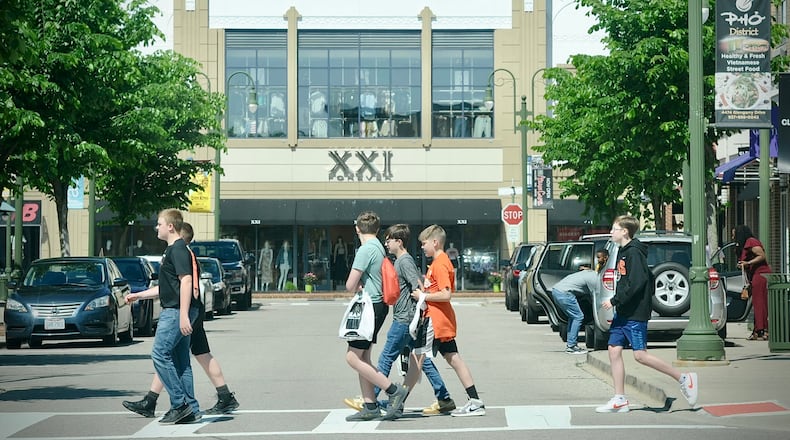Representatives of the Greene said Tuesday night that the mall remains open for business, and that the mall is “excited to announce new and first-to-market tenants to the Dayton market.”
The Dayton Daily News spoke about The Greene’s issues with Kelly Gray, senior vice president of sales and leasing at Equity Commercial Real Estate Solutions. Gray specializes in retail and restaurant sales leasing, including with properties at the Greene over the course of her career.
Gray said in terms of the customer’s experience of the Greene, the likelihood of some great change is “little to none.”
“There is basically 0% chance of things folding up and closing down,” Gray said. “That’s not going to happen, because it’s a great piece of real estate, it’s a great location, and it has good tenants.”
Instead, one of two outcomes is more likely: the lender goes through a legal process to sell the property, and use the proceeds to pay off the loan, or the company will enter into bankruptcy.
Lawsuit and Greene reaction
According to Wells Fargo’s complaint, Greene Town Center LLC entered into a deal in which Citigroup Global Markets Realty Corp. agreed to loan them $137.25 million in November 2013, seven years after The Greene first opened. In March 2014, the deal was severed into two promissory notes ($90 million and $47.25 million), which eventually were transferred to Wells Fargo.
The complaint says those notes “are in default as the result of borrower’s failure to pay all amounts due thereunder by the Dec. 1, 2023 maturity date. As a result … all unpaid principal, all accrued and unpaid interest and all other amounts due under the notes are immediately due and owing.”
Wells Fargo claims that as of May 1, it is owed $71.8 million on the $90 million note, and $41.1 million on the $47.25 million note, plus interest that continues to accrue at $28,780 per day.
The complaint asks “that the real property and fixtures be ordered sold, and that the plaintiff be paid out of the proceeds of such sale,” plus possible other relief.
Representatives of The Greene said this is a continuing process.
“The Greene Town Center has been actively engaged with its lender, negotiating in good faith and over a period of time, to find a reasonable and mutually agreeable outcome,” a spokesperson for the Greene said Tuesday evening. “While we are disappointed with the recent actions of the lender, it is our intention to continue to work with them to find a resolution.”
As of Thursday morning, there had been no new filings in the foreclosure suit since the initial May 10 complaint.
Industry expert analyzes case
Though it is not confirmed in the Greene’s case, The Greene’s current situation is symptomatic of what’s called a “balloon mortgage.” Gray noted it is not unusual for businesses to take out this kind of loan, under which the amortization of the loan may be for a much greater length of time than the maturity.
“So for example, I might take a 10-year loan, but have a 20-year amortization on the loan. So at the end of my loan term, I’m not fully paid off,” she explained.
The borrower benefits from initial payments being much lower than they ordinarily would be, which is helpful early on in a development as rental income is low. Typically, under this process, the borrower will continue to make proper payments on the loan, then at the end of the term, they either owe a large lump sum, or refinance the loan.
The problem is, it’s a terrible time to refinance right now.
“Again, it’s not unusual,” Gray said. “We’re in the environment today where interest rates have gone up exponentially. And when I’m trying to go to the market and get a new loan to refinance my balance, the loan-to-value numbers don’t necessarily work.”
Balloon mortgages are inherently a gamble, because “you’re just taking a big risk on a future that you don’t know anything about,” Gray said.
Another potential pitfall is The Greene or similar companies receiving decreased rental income due to factors like the pandemic.
A common arrangement with retail and restaurant tenants is, in addition to base rent rate, common area maintenance (such as the park in the middle of the Greene), real estate taxes and insurance, tenants will pay percentage rent, meaning once their sales reach a certain number, they pay as they are able to the landlord.
“The challenge is when you have things like COVID happen, and a lot of retailers and restaurants haven’t recouped fully from those sales, or their sales are still down,” Gray said. “The percentage rent going to, or being payment to a landlord may also be reduced.”
Credit: JIM NOELKER
Credit: JIM NOELKER
County, city of Beavercreek involved
A review of Greene County property records shows the Greene is current on their property taxes.
In 2009, the company entered into an agreement with Greene County to sell $6 million in bonds for roads and streets at the Greene, paid back gradually by special assessment on the property. Since the Greene is current on their taxes, the foreclosure will not affect the bonds, county officials said Wednesday.
According to the city of Beavercreek, property taxes have the highest priority when it comes to foreclosures. Should the property be subject to a legal action, such as being put into a receivership, they said taxes would be paid before loan creditors.
New York-based Olshan Properties has owned the Greene Town Center since it opened in 2006. An organizational chart that Wells Fargo filed with the suit shows three Olshan family trusts and a fourth trust making up an LLC, Greene MLO Associates LLC, which itself has a 92.25% stake in the property. Daypar LLC has a 7.75% stake.





